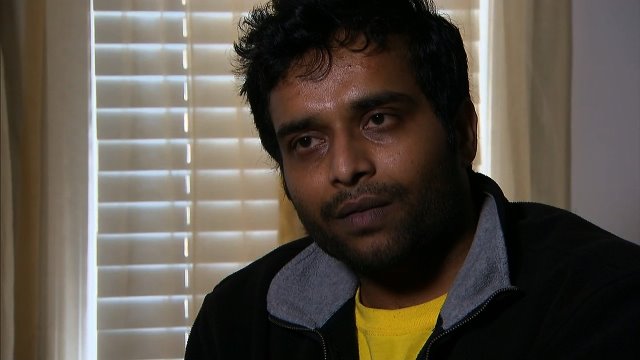Having a couple of drinks after work at Austins Bar & Grill in Olathe, Kansas, was something Alok Madasani did often with his friend Srinivas Kuchibhotla.
The outings were usually so brief the two men, both 32, were home with their families before anyone had time to ask where they had been. Still, the bar was where the friends laughed and were able to unwind after a hard day’s work. It was a place where people knew them, a place where they felt comfortable.
Now, burdened with a memory he is struggling to come to terms with, Madasani’s words are heartrending.
“I just wish we didn’t go there that night.”
Last Wednesday night, as a University of Kansas basketball game played on the bar’s big screen television, Madasani remembers that he and Kuchibhotla were talking on the nearby patio. They weren’t really watching the game, he said. That day the two friends were engaged in their own conversation.
“We were laughing. We were talking.”
“Something is wrong”
Minutes into their first beers, around 6:15p.m., a stranger approached. It was a man they had never seen before. He was pointing a finger at them.
“And all of a sudden, this elderly looking gentleman with anger on his face — you know that something is wrong the way he approaches you,” Madasani said.
Madasani recalls that he didn’t speak to the man, but his friend Kuchibhotla did to be polite.
“He said, ‘No sir, we are here legally, we are on H1B, we are from India.'”
After the exchange, Madasani got up from a chair on the patio and went into the bar. “I had no reason to engage that gentleman in conversation,” he said.
Madasani was surprised at the randomness of the encounter.
“Typically, those things happen after two, three hours and people see you, you’ve been hanging around for awhile, they come to you and start a conversation. It was a half an hour that day when this happened. It was just out of the blue; we didn’t even talk to him or say anything that can provoke it.”
Madasani and his friend were speaking English rather than their native Telugu. Kuchibhotla made it a point to speak English in public, Madasani said.
By 6:45 p.m. the stranger left.
“The sunlight is going away, and you’re in that relaxed zone,” said Madasani, “and we see him leaving. Everyone on the patio was watching because it was not just us he was disturbing. He was disturbing everyone around because they were there for a peaceful evening. When somebody creates drama it affects the people around us.”
“I heard a loud pop right next to my ear”
The peacefulness was short-lived. Within 30 minutes, the friends had heard other patrons saying the man had returned with a gun.
Madasani recalled how what happened next was almost too fast to react to.
“I heard a loud pop right next to my ear, kind of a loud pop.”
He then dropped to the ground and started crawling.
“I wanted to survive,” said Madasani, who is expecting a child with his wife. “To see the kid — that’s what [was] running through my mind.”
As he crawled toward the door he tried to stand. It was then he realized he had an injury to his leg. He fell to the ground once, managed to get himself out to the patio and fell again. He said he couldn’t move.
“It was just too much pain, and a lot of blood.”
On the patio, patrons tended to Madasani’s injury. As one tied a shirt over his leg, Madasani could see his friend, Kuchibhotla, motionless on the ground.
Shooting suspect remains in jail
The alleged shooter, Adam Purinton, 51, was arrested hours later at an Applebee’s restaurant in Clinton, Missouri, 70 miles from Olathe. He faces one charge of first-degree murder and two charges of attempted first-degree murder. Purinton remains jailed on a $2 million bond.
A motive has not yet been established, and the FBI is looking into the case to determine whether the shootings would be considered federal hate crimes.
Days after the shooting Madasani continues to wrestle with why he and his friend ended up at the bar that night.
“I could have said, ‘No,’ but when Kuchibhotla asks you go because it’s him. This guy, Mr. Perfect, who doesn’t drink during the weekdays because he wants to work. That’s the kind of guy he is, and when he asks, you go.”
Madasani said that night, before they went out, he was the one still working.
“I was emailing with a co-worker in California. I could have told Srinivas that I had work to do — ‘Let’s postpone this, we can do that on Friday.’ I should’ve done that.”
Madasani said his friend rarely got angry, didn’t gossip or talk behind people’s backs and that everyone around him was happy.
“He was the kind of guy I wanted to be. He made me a better person.”
A mix of emotions
Madasani knows the violence that took the life of his best friend is not isolated. “Other things go on in this country, in the world, here in Kansas. I can say with confidence what happened is not what this country believes in and what this community believes in.”
He says his friends, white, black and Hispanic — have all expressed sympathy for his loss and he is proud to say that he has family members who have lived in the United States for 50 years, some longer.
But coupled with the support he has received, the events of the past week still prove unsettling.
“I still feel this this is not reality,” he said. “It’s still not sunk in. I still don’t want to believe what’s happening.”
